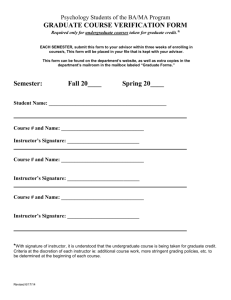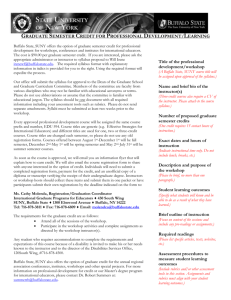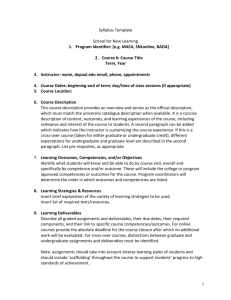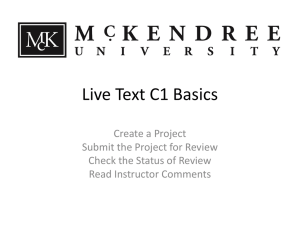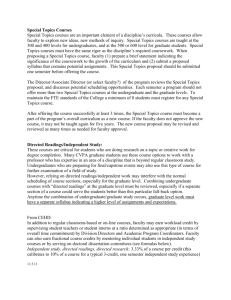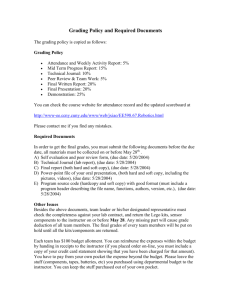UB Syllabus Template
advertisement
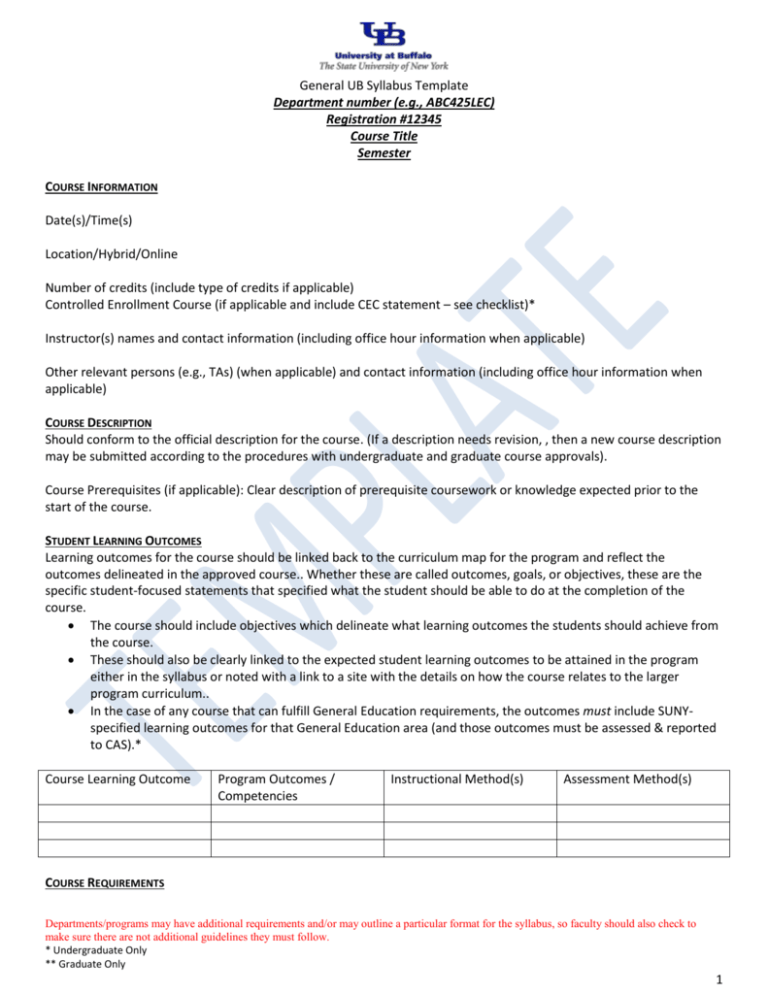
General UB Syllabus Template Department number (e.g., ABC425LEC) Registration #12345 Course Title Semester COURSE INFORMATION Date(s)/Time(s) Location/Hybrid/Online Number of credits (include type of credits if applicable) Controlled Enrollment Course (if applicable and include CEC statement – see checklist)* Instructor(s) names and contact information (including office hour information when applicable) Other relevant persons (e.g., TAs) (when applicable) and contact information (including office hour information when applicable) COURSE DESCRIPTION Should conform to the official description for the course. (If a description needs revision, , then a new course description may be submitted according to the procedures with undergraduate and graduate course approvals). Course Prerequisites (if applicable): Clear description of prerequisite coursework or knowledge expected prior to the start of the course. STUDENT LEARNING OUTCOMES Learning outcomes for the course should be linked back to the curriculum map for the program and reflect the outcomes delineated in the approved course.. Whether these are called outcomes, goals, or objectives, these are the specific student-focused statements that specified what the student should be able to do at the completion of the course. The course should include objectives which delineate what learning outcomes the students should achieve from the course. These should also be clearly linked to the expected student learning outcomes to be attained in the program either in the syllabus or noted with a link to a site with the details on how the course relates to the larger program curriculum.. In the case of any course that can fulfill General Education requirements, the outcomes must include SUNYspecified learning outcomes for that General Education area (and those outcomes must be assessed & reported to CAS).* Course Learning Outcome Program Outcomes / Competencies Instructional Method(s) Assessment Method(s) COURSE REQUIREMENTS Departments/programs may have additional requirements and/or may outline a particular format for the syllabus, so faculty should also check to make sure there are not additional guidelines they must follow. * Undergraduate Only ** Graduate Only 1 The number of papers, tests, and any other requirements, such as homework, attendance, class participation, laboratory assignments, and clinical performance, that will count toward the final grade. Deadlines for assignments should also be specified. Assignments should be linked to each of the student learning outcomes being assessed. A single assignment may be used to assess more than one learning outcome, and an outcome may be assessed by more than one assignment. All requirements should relate to the course description and the student learning outcomes. It is strongly recommended that students be provided with clear guidelines as to how their work will be evaluated, whether in the form of rubrics, checklists, exemplars, etc. (Any and all courses that fulfill General Education requirements must assess the SUNY-specified student learning outcomes for that particular General Education area.*) GRADING POLICY Students should be apprised of how various graded activities will be combined to form their single, final grade for the course. How results from various requirements will be combined into a final grade: relative weightings, make-up policy for tests, etc. Grading Policies should also include: Specification of the level of work must be completed in order to obtain specific letter grades (A-F) or a passing grade if the course is graded on a Pass/Fail basis (Undergraduate - http://undergradcatalog.buffalo.edu/policies/grading/explanation.shtml; Graduate - http://grad.buffalo.edu/Academics/PoliciesProcedures/Grading-Procedures.html) Reference to the university Undergraduate* (http://undergradcatalog.buffalo.edu/policies/grading/explanation.shtml#incomplete) or Graduate** (http://grad.buffalo.edu/Academics/Policies-Procedures/Grading-Procedures.html) Incomplete Policy o Any additional instructor requirements and comments regarding the use of Incomplete grades. Learning assessments will be graded based on rubric criteria and weighted according to the following break-down. Weighting Assessment / Assignment xx% xx% xx% 100% Final Grades: Grade A AB+ B BC+ C CD+ D F Quality Points 4.0 3.67 3.33 3.00 2.67 2.33 2.00 1.67 1.33 1.00 0 Percentage 93.0% -100.00% 90.0% - 92.9% 87.0% - 89.9% 83.0% - 86.9% 80.0% - 82.9% 77.0% - 79.9% 73.0% - 76.9% 70.0% - 72.9% 67.0% - 69.9% 60.0% - 66.9% 59.9 or below Departments/programs may have additional requirements and/or may outline a particular format for the syllabus, so faculty should also check to make sure there are not additional guidelines they must follow. * Undergraduate Only ** Graduate Only 2 Incompletes (I/IU)*: A grade of incomplete (“I”) indicates that additional course work is required to fulfill the requirements of a given course. Students may only be given an “I” grade if they have a passing average in coursework that has been completed and have well-defined parameters to complete the course requirements that could result in a grade better than the default grade. An “I” grade may not be assigned to a student who did not attend the course. Incompletes (I/IU)**: Prior to the end of the semester, students must initiate the request for an “I” grade and receive the instructor’s approval. Assignment of an “I” grade is at the discretion of the instructor. For all graduate-level courses, an interim grade of Incomplete (I) may be assigned if the student has not completed all requirements for the course. An interim grade of 'I' shall not be assigned to a student who did not attend the course. For all graduate courses the default grade accompanying an interim grade of 'I' shall be 'U' and will be displayed on the UB record as 'IU.' The default Unsatisfactory (U) grade shall become the permanent course grade of record if the 'IU' is not changed through formal notice by the instructor upon the student's completion of the course. Assignment of an interim 'IU' is at the discretion of the instructor. A grade of 'IU' can be assigned only if successful completion of unfulfilled course requirements can result in a final grade better than the default 'U' grade. The student should have a passing average in the requirements already completed. The instructor shall provide the student specification, in writing, of the requirements to be fulfilled. ACADEMIC INTEGRITY Academic integrity is a fundamental university value. Through the honest completion of academic work, students sustain the integrity of the university while facilitating the university's imperative for the transmission of knowledge and culture based upon the generation of new and innovative ideas. Reference to the university Undergraduate* (http://undergradcatalog.buffalo.edu/policies/course/integrity.shtml) or Graduate** (http://grad.buffalo.edu/Academics/PoliciesProcedures/Academic-Integrity.html) Academic Integrity policy and any additional instructor requirements and comments regarding academic dishonesty. ACCESSIBILITY RESOURCES If you have any disability which requires reasonable accommodations to enable you to participate in this course, please contact the Office of Accessibility Resources, 25 Capen Hall, 645-2608, and also the instructor of this course .. The office will provide you with information and review appropriate arrangements for reasonable accommodations. http://www.student-affairs.buffalo.edu/ods/ COURSE FEES The dollar amount of any course-specific fees above and beyond UB tuition and fees, as well as the reason such fees are being assessed. Departments/programs may have additional requirements and/or may outline a particular format for the syllabus, so faculty should also check to make sure there are not additional guidelines they must follow. * Undergraduate Only ** Graduate Only 3 Optional Components COURSE ORGANIZATION / SCHEDULE (AS INDICATED IN THE FACULTY HANDBOOK, FINALS MAY NOT BE GIVEN DURING THE SEMESTER, BUT RATHER DURING THE SCHEDULED EXAM PERIOD). Week # and/or Topic Required Readings / Assignments(s) Due Date Date COURSE MATERIALS Required and recommended materials, resources, textbooks, and resources citations. Availability of course materials or resources can be specified (e.g., items on reserve through the library; use of UBLearns Blackboard site) ATTENDANCE POLICY May include reference to: Attendance issues related to religious observances University sanctioned events Athletic commitments Family/Work obligations/emergencies Course Cancellation/ Emergency Planning Reference the university website for cancellations/delays due to weather or other unforeseen events (http://emergency.buffalo.edu/campus-weather-alerts.html) INSTRUCTOR AND COURSE SUPPORT STAFF INFORMATION Relevant professional information and/or teaching philosophy. Roles and responsibilities of course support staff (i.e., TAs/Gas). LAB SAFETY Guidelines for lab safety, including policies and procedures. CLASSROOM DECORUM Discussion of classroom expectations, for example tardiness, and/or use of cell phones and laptops. UNIVERSITY SUPPORT SERVICES Students are often unaware of university support services. For example, the Center for Excellence in Writing provides support for written work, and several tutoring centers on campus provide academic success support and resources. Departments/programs may have additional requirements and/or may outline a particular format for the syllabus, so faculty should also check to make sure there are not additional guidelines they must follow. * Undergraduate Only ** Graduate Only 4
